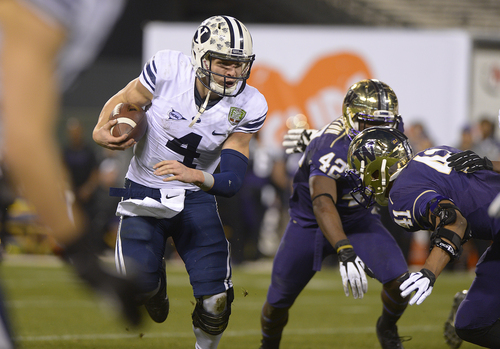This is an archived article that was published on sltrib.com in 2013, and information in the article may be outdated. It is provided only for personal research purposes and may not be reprinted.
San Francisco • Taysom Hill undoubtedly will compile all kinds of statistics in the remaining two seasons of his BYU football career, just as he did against Washington in the Fight Hunger Bowl.
What's missing is a December victory, and Hill will have wait another year to do what quarterbacks Max Hall, Jake Heaps, Riley Nelson and James Lark had done for the Cougars lately.
After a remarkable second-quarter showing, Hill was subdued by the Huskies in the second half of Washington's 31-16 victory Friday night at AT&T Park.
Hill did everything he could, in an effort that left his white jersey and socks covered with stains from the outfield grass of the San Francisco Giants' ballpark. He personally produced 426 total yards, but those numbers were not enough to add distinction to a sophomore year that basically ended with a pass that Washington linebacker John Timu intercepted.
Hill was left wishing he could have thrown the ball more effectively in the second half, exploiting Washington's coverage that dared him to do so. Looking to next season, "Those are the things that are most glaring to me right now," he said.
BYU coach Bronco Mendenhall remains encouraged about the offense. "It's not even close to the same team it was a year ago," he said. "I think we all know that."
But this ending was unsatisfying, because the Fight Hunger Bowl offered BYU a nice opportunity to enhance its season. The Cougars were meeting a solid, middle-tier program from the Pac-12, a marked upgrade over their recent bowl opponents from Conference USA and the Mountain West.
In other words, Washington could do for BYU what Texas-El Paso, Tulsa and San Diego State could not do. But the Cougars just couldn't overcome Washington's speed and playmaking ability, regardless of how much Hill tried to elevate his team.
BYU was scoreless in the second half. The Cougars had thrived with a play-action slant pass, but the Huskies "adjusted and took that away," Hill said.
That's a credit to Washington defensive coordinator Justin Wilcox, who remained a big part of a makeshift staff in the transition from Steve Sarkisian to Chris Petersen — with quarterbacks coach Marques Tuiasosopo in charge for the bowl game.
Hill succeeded in making Tuisasosopo hold his breath and wonder, "Can we please tackle their quarterback?"
Hill responded well in his first bowl game, as did BYU receiver Cody Hoffman in his fourth one. The senior had 12 catches for 167 yards. That gave him 38 receptions for 540 yards in postseason play, with passes coming from four starting quarterbacks.
Even so, the Huskies held him down in the second half and Hoffman missed an opportunity to make a big play at a critical stage. Trailing 28-16, the Cougars took over at the UW 26 after Robertson Daniel's interception, but they failed to score as Hoffman couldn't catch a ball in the end zone and Justin Sorensen missed a field-goal try.
BYU gained only 54 total yards in the third quarter after having 297 yards at halftime. The Cougars finished with 473 yards to Washington's 319.
Starting with Hall's senior season of 2009, the Cougars had won bowls with four different QBs. Hall beat Oregon State in the Las Vegas Bowl, Heaps topped Texas-El Paso in the New Mexico Bowl, Nelson edged Tulsa in the Armed Forces Bowl and Lark defeated San Diego State in the Poinsettia Bowl.
Hill took his turn against the Huskies, appearing for the first time in the Bay Area, where he originally intended to play football for Stanford before switching to BYU after his church mission.
Hill started slowly, before producing an amazing second quarter. The Cougars gained 246 yards in the period and Hill was responsible for a huge chunk of them, finishing the half with 185 passing yards and 77 rushing yards.
Hill's workload resembled his effort in BYU's win at Houston in October, as he ran or passed on 35 of BYU's 57 plays in the first half.
The trouble was the offense's failure to finish drives, the same issue that has hurt the Cougars all season against high-level opponents. They settled for three field goals. Kickoff coverage also was a problem, with BYU allowing a 100-yard return for a touchdown and another long runback that led to a Washington score.
In the third quarter, the Cougars allowed UW to score again on its opening drive, and then failed to take advantage of the game's only turnover.
The result was that even after everything he did in San Francisco, Hill left room for improvement next December in an unknown destination.



